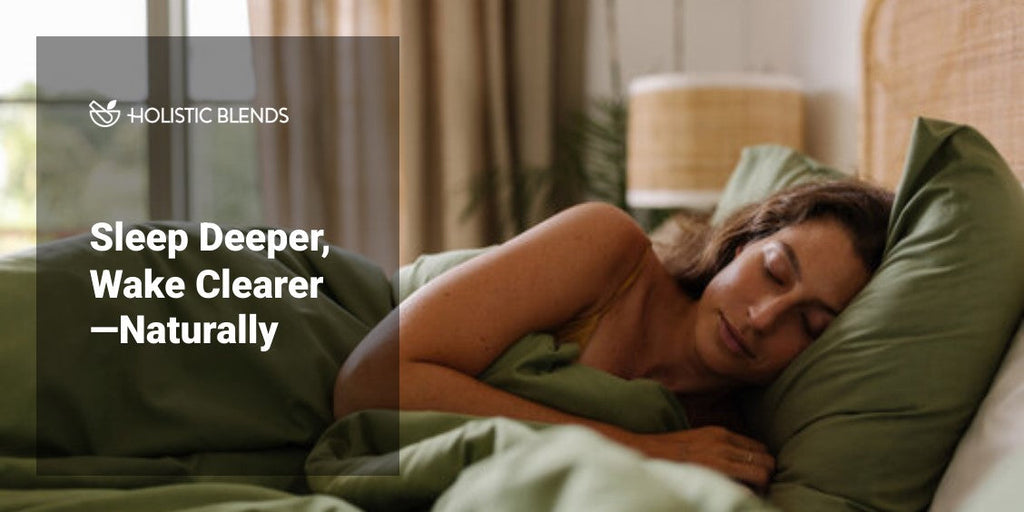It’s been said that you never truly appreciate something until you lose it — and nowhere is that truer than with a good night’s sleep!
Unfortunately, sleep problems are on the rise. According to the National Institutes of Health, up to 70 million Americans struggle with sleep disorders, and about one in three adults report not getting enough rest.
This is a growing concern because the cost of poor sleep goes far beyond feeling tired and cranky. Even worse, the typical remedies for insomnia can sometimes be more harmful than the problem itself!
The Health Effects of Losing Sleep
Lack of sleep takes its toll in countless ways — and it doesn’t take long to feel the effects.
Just one poor night’s sleep can cause:
-
Mood changes and irritability
-
Difficulty concentrating
-
Drops in essential nutrients like zinc and magnesium
-
Rapid depletion of vitamin C
-
Weakened immune function (making you more susceptible to illness)
The long-term effects are even more concerning. Regularly sleeping fewer than seven hours per night can:
-
Increase your risk of accidents at work or while driving
-
Disrupt gut health and microbiome balance, leading to inflammation and leaky gut
-
Elevate hunger hormones and contribute to weight gain
-
Quadruple your risk of depression
-
Double your risk of Type 2 diabetes
-
Impair brain function and memory
-
Raise your risk of high blood pressure, Alzheimer’s, cancer, and triple your risk of heart disease
Why Sleep Drugs Can Make Things Worse
When insomnia hits, many people are prescribed sleep medications like Lunesta or Ambien — but these drugs often cause more harm than good.
In addition to addiction potential and difficult withdrawal symptoms, side effects can include:
-
Dizziness and poor coordination
-
Daytime drowsiness
-
Memory loss
-
Depression and anxiety
-
Hallucinations and confusion
-
Aggression or suicidal thoughts
Even more discouraging — studies show sleep medications only increase total sleep time by five to thirty minutes on average.
The Sandman’s Calling — Here’s How to Sleep Naturally
The good news? You can improve your sleep naturally by addressing the underlying causes.
Here are six effective, drug-free ways to start sleeping better tonight:
1. Reduce Stress
If stress, anxiety, or tension are keeping you up, it’s time to take action.
-
A qualified counselor can help — just make sure they’re not quick to prescribe more medication.
-
Exercise regularly (with your doctor’s approval) — it’s one of the best stress relievers around.
-
Consider adopting a pet for companionship and emotional support.
-
Avoid late-night news, thrillers, or violent shows that can spike anxiety and make sleep elusive.
2. Avoid Sugar, Alcohol, and Stimulants
We all know caffeine can sabotage sleep — but sugar and alcohol can too.
A diet high in sugar and refined carbs raises cortisol, a stress hormone that can keep you alert when you should be winding down.
And while alcohol may help you fall asleep faster, it often disrupts sleep cycles, leaving you tired and groggy the next day.
3. Darken Your Room
Light exposure interferes with melatonin production — your body’s natural sleep hormone.
Eliminate light sources like night lights, alarm clocks, and cell phones. Install room-darkening shades to block out streetlights or outdoor lights. Your bedroom should be as dark and peaceful as possible.
4. Review Your Medications
Certain prescriptions — such as bronchodilators for asthma or antidepressants — can trigger insomnia.
Check your medication inserts for “insomnia” as a listed side effect, and if it’s there, talk to your doctor about alternatives. If they’re unwilling to discuss options, consider getting a second opinion.
5. Get Enough Omega-3 Essential Fatty Acids
Research shows higher levels of DHA (Docosahexaenoic acid) — an omega-3 fatty acid — are linked to better sleep quality.
Since most diets are low in omega-3s, supplementation can make a real difference.
A quality fish oil like VitalMega-3 provides 1,200 mg of omega-3s per serving, with EPA and DHA in the expert-recommended 3:2 ratio to support brain, heart, and sleep health.
6. Support Natural Melatonin and Nutrient Balance
Your body needs the amino acid tryptophan to make melatonin (for sleep) and serotonin (for mood).
Good food sources include chicken, eggs, cheese, tuna, nuts, seeds, and milk.
Melatonin is also naturally found in bananas, oats, rice, tomatoes, and cherries.
In addition, your body needs these nutrients to produce melatonin:
-
Vitamin B6
-
Zinc
-
Magnesium
-
Folic acid
While a healthy diet helps, supplementing with a complete multivitamin like Super Core ensures you’re getting consistent levels of these key nutrients — along with antioxidants and anti-inflammatory compounds to support overall wellness.
Better Sleep Is in Your Future
When you identify the root causes of your poor sleep and take simple, natural steps to address them, restful nights will return — and your body will thank you in ways you can’t even imagine.
To your health,
Sherry Brescia











